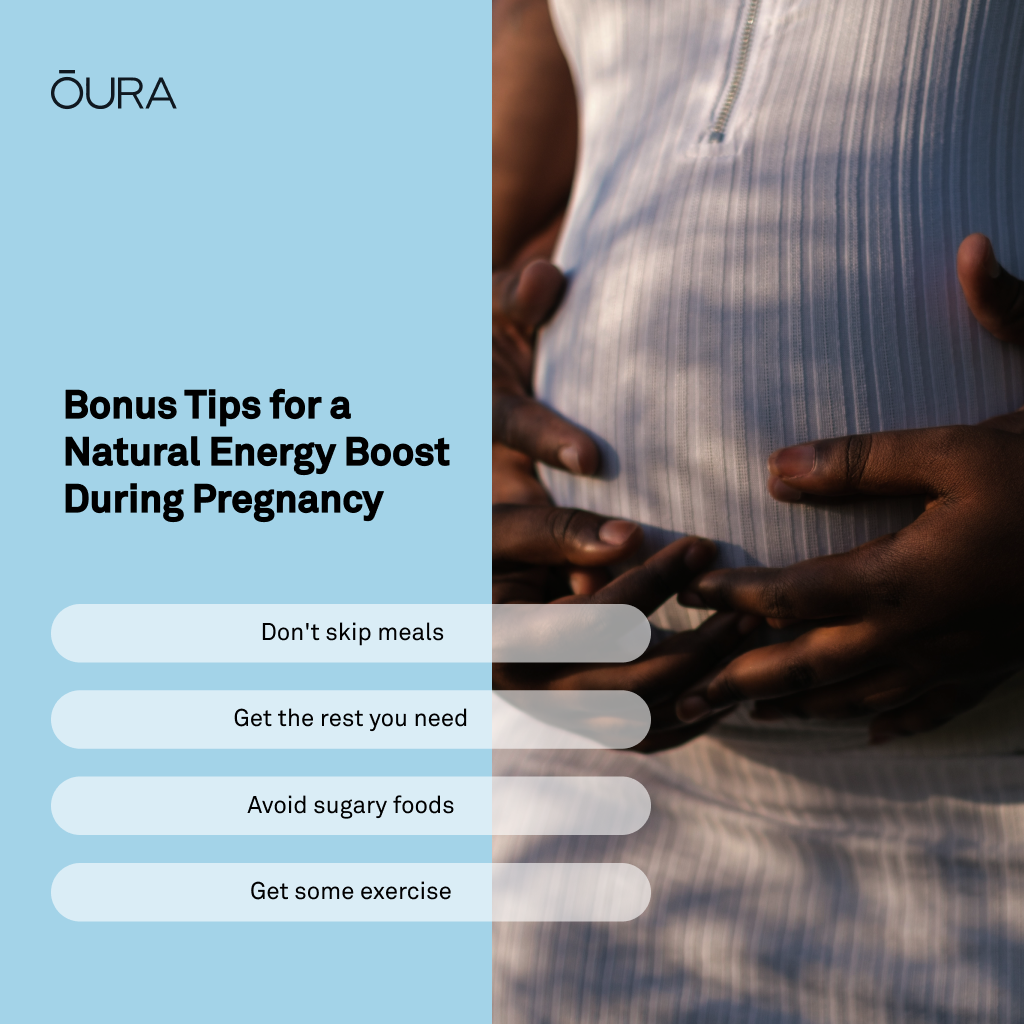Looking for a coffee replacement for pregnancy? Good news: You don’t have to go completely cold turkey on caffeine during pregnancy—but if you’re a coffee addict, you might be looking for some smarter swaps.
Whether you’re cutting back for your baby, your sleep, or just to keep the jitters at bay, these pregnancy-safe coffee alternatives have your back (and your energy).
| Member Tip: Follow your pregnancy on Oura and get helpful insights for each trimester with Pregnancy Insights. |
Should You Drink Coffee During Pregnancy?
If you can’t function without your morning caffeine boost, worry not. Caffeine in pregnancy is not off limits—just with some limitations.
“Many women struggle to complete their work or daily activities during pregnancy because of overwhelming fatigue,” says Dr. Chris Curry, OB/GYN, Clinical Director of Women’s Health at Oura. “These women torment themselves by withholding caffeine when they desperately need it, out of fear. The good news is that they don’t need to cut out all caffeine.”
Your morning cup of joe is safe for now. But don’t go overboard: The American College of Obstetricians and Gynecologists (ACOG) recommends that pregnant women max out their caffeine intake at 200mg per day—roughly equivalent to one 12-ounce cup of coffee. It’s also worth remembering that caffeine is found in more than just coffee: tea, chocolate, energy drinks, and soda.
The reason for this limitation is due to the impact of caffeine on the blood supply to the fetus, which may hinder fetal growth. The research is mixed for the impact of high caffeine intake on someone’s risk of miscarriage, with some studies showing increased risk of miscarriage at high doses, and other studies not showing increased risk. This is why many women look for caffeine alternatives during pregnancy.
READ MORE: How Caffeine Impacts Your Sleep (& How Long It Really Stays in Your System)
Even if you’re staying under the recommended limit, there are other reasons you might want to cut back:
- Sleep disruption: Caffeine blocks adenosine, the neurotransmitter that makes you feel sleepy, and may raise resting heart rate, making it harder to fall or stay asleep.
- Increased anxiety or jitters: During pregnancy, your body metabolizes caffeine more slowly, which can amplify its effects and lead to feelings of restlessness or palpitations.
- Digestive sensitivity: Caffeine is a known gastrointestinal stimulant, which can aggravate heartburn—a common pregnancy symptom.
READ MORE: What Happens to Your Body During Pregnancy, According to Oura Member Data
Low or No-Caffeine Coffee Alternatives for Pregnancy
If you’re cutting back on caffeine during pregnancy, you’ve got more options than you might think. Below, these caffeine-free or caffeine alternatives for pregnancy can help you keep your morning ritual without the jitters—or the risk.
1. Decaf Coffee
Arguably, the easiest coffee alternative for pregnancy is simply switching to decaf, allowing you to still enjoy the flavor of coffee.
Just know that decaffeinated coffee still contains some caffeine—typically around 2 to 15mg per 8-ounce cup, depending on how it’s processed. That’s significantly less than regular coffee (which averages around 95mg per 8-ounce cup), but it still counts toward your daily limit.
| Member Tip: Curious if caffeine is affecting your sleep? Tag “Caffeine” in the Oura App to track its influence on your sleep quality. After doing this regularly, you may receive a Discovery with a breakdown of how exactly caffeine affects your biometrics and sleep. |
2. Tea
Traditional teas like green, black, white, and oolong all come from the Camellia sinensis plant and contain varying amounts of caffeine. For example:
- Black tea: ~47mg caffeine per 8 oz
- Green tea: ~25–35mg per 8 oz
- White tea: ~15–30mg per 8 oz
These teas can offer antioxidants and health benefits, but you’ll need to monitor your intake during pregnancy to stay under the 200mg daily caffeine limit recommended by ACOG.
3. Herbal Tea
Unlike traditional tea, herbal teas are made from herbs, flowers, roots, or fruits and are typically caffeine-free. However, not all herbal teas are safe during pregnancy, so it’s important to check with your healthcare provider before trying a new blend.
Generally considered safe in moderation:
- Peppermint: May ease gas, bloating, and nausea
- Ginger: May help with nausea and digestion
- Cranberry: Often used for urinary tract support
- Rooibos: Rich in antioxidants and naturally caffeine-free, with low tannins that won’t interfere with iron absorption
Use caution with red raspberry leaf tea. While often recommended for uterine support in late pregnancy, research is limited, and it’s not advised in early pregnancy without medical supervision.

4. Alternative Lattes
If giving up your daily latte feels like a stretch, there are flavorful, pregnancy-friendly alternatives that still feel like a treat.
- Chai lattes are typically made with black tea, which contains caffeine. You can reduce or eliminate the caffeine by choosing caffeine-free chai blends made with just the spices—like cinnamon, cardamom, ginger, and cloves—steamed with milk or a dairy alternative.
- Turmeric lattes, also known as golden milk, contain curcumin, the active compound in turmeric known for its anti-inflammatory and antioxidant properties.
5. Water
One of the first signs of dehydration is fatigue, so if you’re struggling with energy, a glass of water is a good place to start.
Hydration is always important, but during pregnancy, it becomes essential. According to ACOG, you should aim for 8 to 12 cups (1.8 to 2.8 liters) of water daily to support increased blood volume, digestion, and amniotic fluid production. If frequent trips to the bathroom keep you up at night, you can try and limit liquids late in the day.
If you struggle with plain water, infuse it with mint, citrus, cucumber, berries, or ginger to keep it fresh and enjoyable.
6. Matcha Tea
Matcha is a powdered form of green tea made from ground Camellia sinensis leaves (the same plant as traditional green tea). It has a relatively low caffeine content—roughly 35–50mg per gram. Because you consume the whole leaf, matcha tends to be higher in antioxidants than steeped green tea.
In moderation, matcha bay be safe during pregnancy. It’s rich in:
- Catechins, which help protect cells from oxidative stress
- Theanine, which may support relaxation without drowsiness
- Chlorophyll and polyphenols, which have antioxidant and anti-inflammatory effects that support optimal fetal development
Some of those antioxidants, though, may decrease your body’s ability to absorb folic acid. Folic acid is critical to preventing birth defects (neural tube), and so doctors often recommend enjoying green tea in moderation.
7. Energy-Boosting Smoothies
Smoothies can be a nutrient-dense and energy-boosting caffeine replacement. A well-balanced smoothie delivers steady fuel without the crash that often follows a cup of coffee—especially when made with whole foods rich in fiber, healthy fats, and protein.
To support energy and blood sugar stability, try blending:
- Bananas or berries for natural carbohydrates and antioxidants
- Leafy greens (like spinach) for iron and folate
- Nut butter or chia seeds for sustained energy from healthy fats
- Greek yogurt or protein powder for added satiety and muscle support
8. Hot Cocoa
If you’re craving something warm and cozy, hot cocoa can be a satisfying (and healthy) coffee alternative, and only has a small amount of caffeine (about 12mg per tablespoon). Cocoa is abundant in nutrients like antioxidants (containing more than red wine and green tea!) magnesium, and flavonoids, naturally stimulating serotonin production to support mood, energy, and circulation. However, research suggests that it should be enjoyed in moderation in the third trimester, when excess polyphenols may affect fetal circulation.
Enjoy a classic hot cocoa by mixing unsweetened cocoa powder and warm milk or water, or upgrade to raw cacao powder, which is less processed and offers more nutritional benefits.
9. Kefir
Kefir is a great naturally energizing alternative to coffee—as long as it’s pasteurized. Unpasteurized dairy products are not recommended during pregnancy due to the risk of foodborne illness.
Kefir is a fermented milk drink that provides a combination of protein, probiotics, and B vitamins, which can help support sustained energy, digestion, and nutrient absorption. Its natural probiotic content also supports gut health, which plays a key role in immune function and overall well-being during pregnancy.
Some studies suggest that kefir may be linked to a reduced risk of preterm birth when consumed in early pregnancy, and may also help lower the risk of preeclampsia, though more research is needed to confirm these effects.
| Member Tip: Let Oura Meals unpack how well your choices are fueling you, so you can feel your best each day. Beat cravings and energy slumps, identify nutritional imbalances, and stay on track toward your goals. |
Caffeine by the Numbers: What to Watch While Pregnant
You might be surprised to learn that caffeine can be in unsuspecting places, like soda or a chocolate bar. Below, find the approximate caffeine content in an array of snacks and beverages.
| Item | Typical Serving Size | Approx. Caffeine Content |
| Cold Brew Coffee | 12 oz (355 mL) | 155–240 mg (varies widely) |
| Brewed Coffee (drip) | 8 oz (240 mL) | 95–200 mg |
| Espresso (1 shot) | 1 oz (30 mL) | 63–75 mg |
| Energy Drink (e.g., Red Bull) | 8.4 oz (250 mL) | 80 mg |
| Black Tea | 8 oz (240 mL) | 40–70 mg |
| Matcha (1 gram powder) | ~1/2–1 tsp | 35–50 mg |
| Green Tea | 8 oz (240 mL) | 25–35 mg |
| Dark Chocolate (70–85%) | 1 oz (28 g) | 23–28 mg |
| Soda (e.g., Coca-Cola) | 12 oz (355 mL) | 30–40 mg |
| White Tea | 8 oz (240 mL) | 15–30 mg |
| Milk Chocolate | 1.55 oz (44 g) | 9–12 mg |
| Hot Cocoa (unsweetened powder) | 1 tbsp (5g) | ~12 mg |
| Decaf Coffee | 8 oz (240 mL) | 2–15 mg |
| Chocolate Ice Cream | ½ cup (66 g) | ~4 mg |
| Chocolate Chip Cookie (1) | 1 medium (16 g) | ~1–2 mg |
| Herbal Tea (e.g., Peppermint) | 8 oz (240 mL) | 0 mg |
| Rooibos Tea | 8 oz (240 mL) | 0 mg |
Bonus Tips for a Caffeine-Free Energy Boost During Pregnancy

It’s normal to feel more tired than usual during pregnancy. Pregnancy demands more from your body—but fortunately, the right habits can make a big difference in how you feel.
However, replacing your usual brew with one (or more) of the substitutes above isn’t the only way to boost your energy during pregnancy.
Here are four science-backed ways to naturally support your energy throughout the day:
- Fuel your body. Your energy needs increase during pregnancy, especially in the second and third trimesters. Skipping meals can lead to blood sugar dips and energy crashes. Instead, aim for regular, balanced meals with a mix of complex carbohydrates, protein, and healthy fats to support steady energy levels.
- Cut back on sugar. That mid-afternoon sweet treat might feel like a quick fix—but it often backfires. Foods high in added sugar can cause a rapid blood sugar spike followed by a crash, leaving you more tired than before. Focus on slow-burning snacks like a handful of nuts, Greek yogurt with berries, or hummus with veggie sticks.
LEARN MORE: Why Your Energy Crashes in the Afternoon (And 9 Ways to Fix it)
- Get the rest you need. Fatigue is common in pregnancy, especially in the first and third trimesters. Don’t fight it. Your body is working overtime, and getting enough sleep and rest is crucial for maintaining hormone balance, boosting immunity, and regulating energy levels.
| Member Tip: Naps longer than 15 minutes are automatically detected by Oura and contribute to your daily Sleep Score. During pregnancy, this provides a more comprehensive view of your daily rest. |
- Move your body. Light to moderate exercise—like walking, stretching, or prenatal yoga—can improve circulation, reduce fatigue, and boost mood-enhancing endorphins. Just 10–20 minutes of movement can help combat stress and shift your energy.
Coffee Alternatives for Pregnancy: The Bottom Line
Pregnancy often brings about significant changes—including changes to your caffeine habits. But reducing your caffeine intake doesn’t mean giving up your morning ritual. From matcha to hot cocoa to nutrient-packed smoothies, there are plenty of safe and satisfying coffee alternatives during pregnancy. The key is finding what works for your body, supports your energy naturally, and keeps both you and your baby feeling your best.
FAQ: Coffee Alternatives for Pregnancy
Can you drink coffee during pregnancy?
Yes, you can drink coffee during pregnancy in moderation. Most experts, including ACOG, recommend keeping caffeine under 200mg per day—about one 12-ounce cup of coffee.
How much caffeine can you have in pregnancy?
Pregnant women can safely have up to 200mg of caffeine per day. This includes all sources, not just coffee—such as tea, chocolate, and energy drinks.
Does caffeine increase miscarriage risk?
Research is mixed. Some studies show a higher risk of miscarriage with high caffeine intake, while others do not. This is why many women look for caffeine alternatives for pregnancy to lower their intake.
What are the best coffee alternatives for pregnancy?
The best coffee alternatives during pregnancy include decaf coffee, herbal teas (like rooibos or peppermint), turmeric lattes, matcha in moderation, smoothies, and hot cocoa. These options let you enjoy your routine with less caffeine.
What is the healthiest coffee replacement for pregnancy?
The healthiest coffee replacements for pregnancy are caffeine-free herbal teas, rooibos lattes, or nutrient-dense smoothies with leafy greens, fruit, and protein. These support hydration, steady energy, and overall wellness.
RELATED: How These Women Are Using Oura as a Guide During Pregnancy & Motherhood













